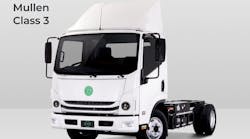While its name is often associated with cable television, Internet and telecommunications services provider Cox Communications, Atlanta-based Cox Enterprises also incorporates Cox Automotive and Cox Media Group. Some of the company’s major brands include Autotrader, Kelley Blue Book, Manheim and Valpak.
“Fleet is a shared service across all parts of Cox Enterprises,” says Jim Bigelow, director, Enterprise Fleet. “We coordinate and work to bring together the resources of fleet, operations and safety teams, and department users to field an efficient, productive and safe fleet.”
What Bigelow calls a “well-rounded team” also brings to bear the resources of Manheim, a provider of vehicle remarketing services. For most of the more than 13,000 vehicles in its fleet, Cox uses Manheim shops for maintenance and repairs, and to handle upfitting needs.
“We’re all part of one company, so the Manheim shop managers and technicians operate under the Cox fleet umbrella,” Bigelow explains. “We’re also rolling out Chevin Fleet Solution’s FleetWave software system-wide through the third quarter of this year.
“We issued an RFP based on a need for a system that captures fleet details across all departments and provides up-to-date operational, cost and performance information from outside service providers and internal information management systems,” Bigelow says. “Chevin was chosen to centralize fleet management information, so we can improve asset utilization and lower costs with real-time visibility over spending.”
The Cox fleet management team also coordinates with Cox Conserves, the company’s national sustainability program that aims to reduce waste and energy consumption.
When a supplier approaches Cox or the company identifies a new technology, the Cox Conserves team researches its environmental impact and potential for a favorable return on investment. “For example, we tested natural gas vehicles, but infrastructure and operational challenges led us to conclude they are not the right fit for our operation,” Bigelow says. “We’ve also been looking at hybrids but determined that the weight of the system’s batteries would limit carrying capacity for certain applications.”
On the other hand, Cox is continuing to invest in Mercedes-Benz Sprinter vans, which are now specified with an engine software package that makes the diesel-powered vehicles even more fuel efficient. The company is also discussing new ideas for lighter weight and more efficient aerial devices with manufacturers. Supplied mainly by Altec and ETI on Ford chassis, bodies and buckets now include electric-hydraulic hybrid units.
Also ongoing is a pilot test of the XL Hybrids XL3 hybrid electric drive system on Chevrolet Express vans and possibly in the future on Ford Transits. With an anticipated ROI of about three years and the ability to easily move the system to a new chassis, the XL Hybrids bolt-on solution may make sense for vehicles on urban routes where its regenerative braking feature can help save fuel.
As a shared service among all Cox companies, fleet decisions are business decisions, Bigelow notes. “For that reason,” he says, “we’re moving to standardize vehicles when it’s feasible, but only after users’ needs are met. Simultaneously, we’re aligning replacement cycles to better manage purchasing and to take advantage of the latest and most efficient vehicle offerings.”
Overall, Bigelow concludes that the Cox Enterprises fleet is the beneficiary of a world-class team of professionals from different disciplines. “Those resources give us the ability to do everything first class,” he says.



